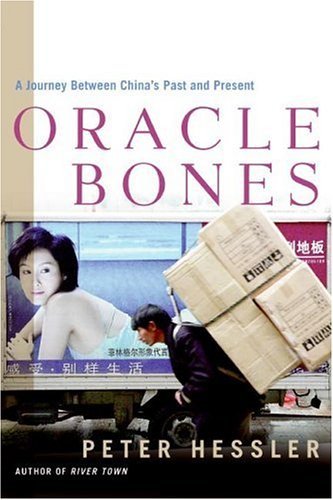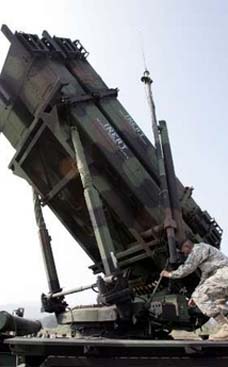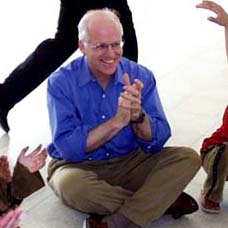
The past is “constantly being redefined and perceived in different ways,” said the writer, who is fluent in mandarin. “You really do see traditional architecture and old cities being torn down to make way for the new economy. And yet that same construction craze and boom has also uncovered countless artifacts and history to redefine the ancient past. You can see the destruction and creation.” Author Peter Hessler served as a Peace Corps Volunteer in China.
In his new book on China, Peter Hessler embraces past and present through the voices of ordinary, extraordinary people
Show me China
In his new book on China, former Missourian Peter Hessler embraces past and present through the voices of ordinary, extraordinary people.
By LYNN ISRAEL of the Tribune’s Staff
Published Saturday, April 22, 2006
Writer Peter Hessler has traveled far — in time and space, language and culture — from his hometown of Columbia. Nowadays, the Beijing-based correspondent for The New Yorker finds himself in a Chinese river of humanity — more than 1 billion people strong — inexorably rushing toward the future. Hessler, however, is more than simply a passenger in the proverbial boat.
The author of the celebrated 2002 “River Town” once again reveals his adeptness as an observer of the People’s Republic of China in his latest book, “Oracle Bones,” to be released Tuesday.
Interviewed by telephone, the writer was in New York last week preparing to crisscross the country for an eight-city book tour that kicks off at 5:30 p.m. Thursday at the 9th Street Bookstore in Columbia. The tour continues in Los Angeles, Seattle, San Francisco, Minneapolis, Washington, D.C., Boston and New York.
The book title refers to mysterious inscriptions found on animal bones and turtle shells from the 3,000-year-old Shang dynasty. The bones as well as the Chinese language itself fascinate the writer, who views them as links to the past and as keys to understanding present-day China.
Such a conviction seems unlikely in modern China. It is a powerhouse of a place where almost overnight, small towns swell into giant manufacturing cities containing millions of busy workers determined to carve out a better life. But China’s past, Hessler said, has a way of reasserting itself.
The past is “constantly being redefined and perceived in different ways,” said the writer, who is fluent in mandarin. “You really do see traditional architecture and old cities being torn down to make way for the new economy. And yet that same construction craze and boom has also uncovered countless artifacts and history to redefine the ancient past. You can see the destruction and creation.”
His book is a close-up and personal portrait of today’s China. Hessler puts a human face to this frenetic but inspiring world by writing narratives about himself and the Chinese he meets and often befriends.
His subjects are not politicians and bureaucrats but mostly ordinary citizens. They include his former English language student, who took the name William Jefferson Foster; a migrant factory worker named Emily who migrated to the “Overnight City” of Shenzhen; Polat, a member of a Chinese Islamic minority group who emigrates illegally to the United States before the Sept. 11, 2001, attack; and one of China’s most famous actors, Jiang Wen, whom Hessler interviewed during the filming of a Western in the Gobi Desert.
Hessler has maintained long ties with many of the people in the book — both out of friendship and in the pursuit of cultural understanding.
“I think in China as a writer, one of my goals has been to give the readers in America sort of a sense of what the average Chinese people are thinking and how they are living,” he said. “I think it’s very different from being a journalist in America. In China, the most useful thing you can do is just get a sense of everyday life for more or less average people. And to do that you really have to spend an enormous amount of time with somebody.”
He added, “Oftentimes there are things that are indirect and things that you have to observe.”
Those observations have led him off the beaten track: familiar ground for someone who first went to China as a Peace Corps volunteer in 1996. Three years later, he returned as a freelance writer, which was technically illegal because he lacked the proper visa. “It made me quite nervous,” Hessler admits, referring to that period of his life.
A non-Chinese reporter in China faces special challenges, Hessler acknowledges. Once, village police detained him for a few hours until authorities up the line cleared his passage — a normal reaction in out-of-the-way places where foreigners are a rarity.
And he experienced scrutiny and a few nervous moments during his early days in the communist nation when he was a licensed journalist with a new book coming out.
“I had just gotten a license as a journalist, and I went to a former student’s wedding, and then after the wedding she was interrogated by the police and some of the other people who attended,” he said. “Just by talking to them I realized that a lot of our phone conversations had been tracked — from their interrogation they could tell that they had been listening to us for a while. There was nothing sensitive and nobody got into any more trouble other than being asked a lot of questions, but it was very scary.”
Such distractions aside, Hessler has developed empathy and insight about China’s working people who pursue pragmatic goals. In Hessler’s book, they live by their wits, endure hardships and long job hours, take risks, suffer setbacks and keep going to forge a better life — efforts that should reverberate for American readers.
“They have all come out of this place that has had a very tough history. For every one of these folks, there are another 10 who didn’t make it for one reason or another,” Hessler said. “This is a place that has had just awful wars and famines and political disasters, so I think the people in China are really tough. Anyone who lives there as a foreigner comes away with the impression. I have a tremendous amount of respect for that toughness.
“At the same time, at this particular moment there is opportunity,” he said. “You learn if you are tough, if you are resourceful, it pays off. It’s this combination of being toughened by the past and then being drawn and attracted by this opportunity of the present.”
Hessler suggests Americans should view China in complex terms and not just as a supplier of Wal-Mart goods, a host for the 2008 Olympics or as a competitor for world energy supplies. Ironically, some of the reasons for this lack of subtle knowledge between China and America, Hessler said, come from what both countries have in common: geographic isolation. They also share patriotism, pride of culture and a strong sense of identity.
“I think for China the corner was turned when the outside world became an opportunity and not a threat,” Hessler said, noting how Chinese youngsters learn English as a way to get ahead.
“I think the U.S. since 9/11 has not quite made that shift yet,” he said. “In the U.S. there is a realization that we need to know more about the outside world. But in the U.S. the problem is that we think we need to know more about the outside world because the outside world might attack us. That’s a very hard motivation for learning a language.”
Hessler experienced 9/11 through the prism of a foreigner living in China, viewing hastily made DVDs showing the World Trade Center attacks with dubbed in clips from “Wall Street” and theme music from “Jaws.”
When he visited post-9/11 United States, American friends told him that “everything has changed.” It was a familiar refrain for Hessler, who lives in a country where one day a “river is no longer a river” and old neighborhoods are bulldozed to make way for progress.
He said such events in the United States and China bring into clearer focus the thrust of “Oracle Bones,” which is how history affects the major events of today and how people feel about their relationship to the world. Hessler said the Chinese believe their individual actions are having a cause and effect.
“You are living in this place that is constantly, constantly changing, and you are always struck by how well the people are handling it, and I think in the end they sort of feel in control of it,” he said. “They feel like they are making decisions that lead to a better life.”
Reach Lynn Israel at (573) 815-1714 or at lisrael@tribmail.com.


















